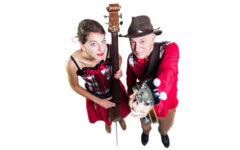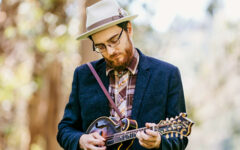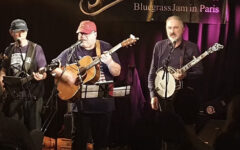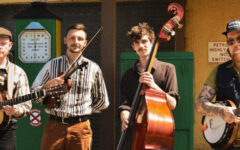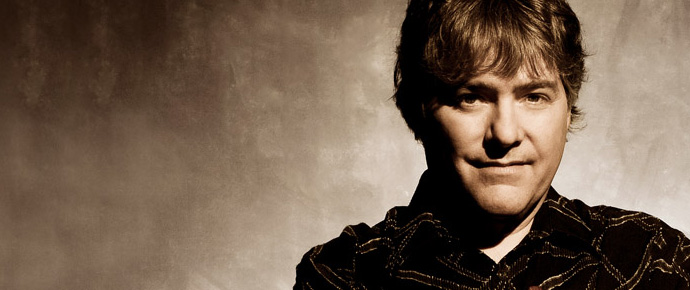
This interview with Béla Fleck was conducted shortly after last year’s Telluride Bluegrass Festival. Jen Hughes spoke with him by phone not long after the festival, which featured a reunion set with The Flecktones. Jen talked with Béla about that, and about his plans for the immediate future.
Béla Fleck’s Deering Crossfire ricocheted off the Telluride box canyon walls and struck us dead-set in the chest: it was the defibrillator we did not even know we needed. Our hearts jump-started, our blood flowed feverishly, and, once again, we remembered that nothing is impossible.
After a four-year hiatus from the road, Béla Fleck and the Flecktones delivered an astronomical set for the faithful. The Grammy-laden banjo great assembled his flying saucer dudes and touched down on Planet Bluegrass to end a two week run. How fitting for the Flecktones to close out at that fantastic otherworldly place known as the Telluride Bluegrass Festival. From the first note of Frontiers, Béla and the boys rocketed us from the San Juan peaks to their outer-space realm for an ecstatic spin through the galaxy. We were as close to heaven as we had ever been before and had no interest in landing back on Earth long after the Flecktones’ last note floated from our orbit.
The Tones treated us to their treasured tunes, ripping solos and laying down the hippest grooves on Sex in a Pan and Prickly Pear and everything in between. We experienced life: Life Without Elvis and Life in Eleven. Sunset Road stole our breath as the sun sunk low in the long Telluride valley. Fleck slayed us with a massive solo on Sweet Pomegranates then revived us for a romp around Stomping Grounds. We were awfully jazzed throughout Sinister Minister and simply could not stop smiling as the hippo landed. Too cool too to see both Sam Bush and John Cowan in the pit cheering for Béla, their New Grass cohort.
Oh, Flecktones, how we have missed you so. That sound. That energy. That propelling us toward positivity and possibility. We are so psyched that your colorful little UFO will be blu-bopping around our big country again soon.
Béla kindly talked with us about the Tones’ Telluride show and the Flecktones’ future, which, it has been announced, includes 2017 shows with The Chick Corea Elektric Band!
As Béla’s magic fingers are always in an array of activities, we also discussed other awesome projects he has going, including his new banjo concerto, his punchy duo with Chris Thile, and the old-timey hip with Abigail Washburn. Not surprisingly, Béla imparted insights on the mind of a musical master: a fascinating glimpse into a creative and uber-thoughtful brain. I mean, this guy has a set list that simply says “harmonics.” While many have been debating the new most interesting man in the world, we actually found him. He carries a banjo.
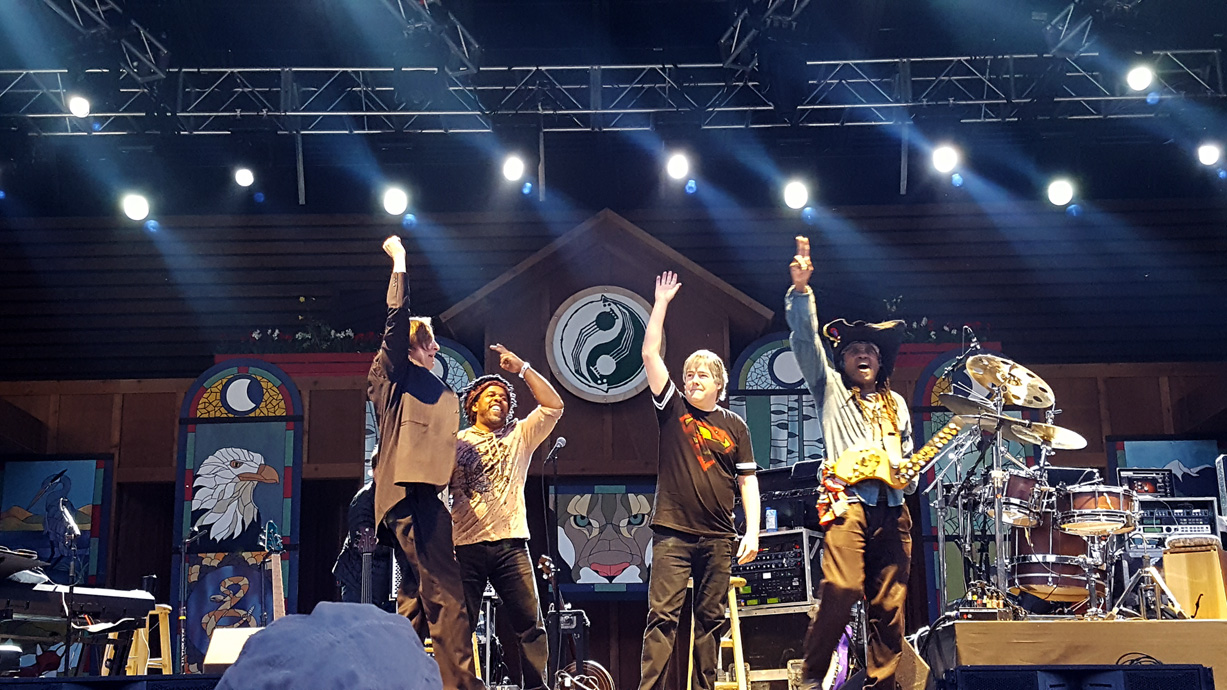
JH: You had a two-week marathon of Flecktones shows last summer. How did it come about?
Béla: We had been talking for quite a while about putting the band back together. When the Flecktones normally get together we’ll work-up a whole new set of music and try to push the music forward into new ground. We always do our best to try to create something new. We were targeting 2017 but at the time nobody could quite pull it off. There was one thing or another getting in the way, because of all the things each of us had going on in our lives. So, we decided, okay, maybe this is not the best time. Part of the reason it was not viable then is that it typically is a long commitment: creating brand new music and touring for a year to support a new record. So, we all had given up on it for this time period. We really love playing together, but, it was just too hard to pull it off.
Then, out of the blue, Craig Ferguson calls up and asks what I am going to do for Telluride this year. This is one of these unusual situations in my life where this wonderful festival that I have all this history with has given me carte blanche – but expects something from me every year that is surprising, special and fairly epic. Some years, I don’t really have anything ready and some years I have got more things than we can do. One year I did the orchestra as well as the string quartet which are two completely different projects and touring units because they were both ready to go.
In 2016, I did not have anything particular in mind. Craig said, “I would love to have the Flecktones back.” We had just decided not to tour in 2017, but I happened to know that one of the Flecktones’ favorite gigs is Telluride. So, I went to the band to see if they would be interested in just doing Telluride and some gigs to lead up to it – without learning a whole new set of material and without giving up a year of everybody’s other projects and lives.
I sent out an email to the guys, figuring someone was going to say no. But, sure enough, it felt like it was within an hour, everybody wrote back and said, “I’m free.” Then, we just needed to work out how available everybody was before Telluride. We were figuring a couple of weeks of playing made sense to push the rock up the hill for a while and try to get it to a great place, and that is what ended up happening.
JH: How hard or easy was it to jump back into the Flecktones’ catalog? Is it like riding a bike for you or were you like, “Whoa, we actually play some complicated stuff”?
Béla: There were some things that I remembered being much simpler than they truly were. There were sections I had forgotten all about. Literally, everything we played, we had played a lot. We were not doing a lot of new stuff. But, Howard was kind enough to learn some of the material we used to do with Jeff Coffin. I did not want to come out and play the exact same material we played the last time we toured together. We already played the tunes that we most wanted to play from the first three albums on the last tour so I said, why don’t we learn a few different tunes this time, particularly ones that would be really nice to have Howard’s harmonica and piano on. So, we did that.
It felt pretty intense, but the truth is we only practiced for three days and at the end of the third day we performed for a bunch of friends and it sounded like us. There was definitely some sort of shock trying to play a few of the things. But, once you figure it out, your hands go back into position and your brain goes into position and you just do it.
JH: Your Sweet Pomegranates solo is pretty complex. Was that a particular spot where you had to put in extra effort after all these years?
Béla: That one is hard. It does not really suit the banjo that well. But, I had made practice tapes years ago of the chord changes of the solo, with a metronome. So, I had a way to practice things like that for a while, and eventually my fingers and brain would figure out what to do.
But, there is nothing like playing with the guys. When you’re with the Flecktones for a few days, your hands are in a whole different state of shape. It was like that in New Grass too. I always felt like the first couple days were good, but that once we got over the hump, the strength and solidity were really there. The ideas were flowing and it was really, really, really, really fun.
JH: When you are not in Flecktones mode do you play your Deering Crossfire much at all?
Béla: That is the first time that instrument has come out of the case in four years. Initially, I had plans to come up with this whole new sound system for it, like a new rock n’ roll pre-amp and a new synthesizer attachment. But, I asked myself, what am I doing? Nobody cares about the synthesizer. It could be cute for a song or two, but eventually I decided to try to get the best sound out of the instrument with the gear I already have. And, luckily, we turned on all my gear from four years ago and it worked.
JH: I assume it was special since that is how the tour originated to end it in Telluride. Can you talk a little bit about what that was like to be up on that stage in the canyon with the Flecktones and your New Grass buddies cheering you on from the poser pit?
Béla: Well, some things are wonderful, but they are not always easy. I was wanting us to do the best we could possibly do as a group, and wanting to play well myself. Everybody I talked to afterwards said it was one of the best sets they have ever heard us do. But I was in my own head a little bit more than I wanted to be, and also struggling with how I felt in the altitude. We had just gotten up there a few hours before the show. So I do think it went well, but it was hard work.
Plus, we had made a deal with Victor. The only way he could do Telluride (and hence the whole tour) was to play on Thursday, so we could get him into Boston by Friday morning for a commitment at Berklee. So we had to be offstage by 8:30 p.m. and a police escort would get him to the airport by 9:00 p.m. before they shut down for the night. So, that made me a little anxious because I had to be watching the clock.
JH: It certainly did not come across.
Béla: That is the great thing about doing the two weeks before that show. We were so in our groove that we could just do our thing, unconsciously.
JH: So, what is next for the Flecktones?
Béla: We have set a new paradigm now, which is that it is possible for us to go out and play for just a couple of weeks – without starting from scratch and trying to reinvent the band each time, although reinventing ourselves constantly is something we have always been proud of. It was always an idealistic move: to never just go out and play our hits – as if we had any real hits – but things like Stomping Grounds and Sinister Minister are easy and we could have just done that. That has never the point of the band. But the truth is we do have such a deep catalog, and there is plenty of old stuff that has lots of life still in it that we can play. There are plenty of musical opportunities.
After this tour I believe we’re more open to doing it when it is right for everybody. In fact, we’ve decided to do an interesting tour in August 2017, co-billing with Chick Corea and his Elektric Band.
Perhaps every year or two we can find a way to get together, and we can certainly get some new music going and make a new creative statement again when the time is right for that. It is all wide open.
But, there are a lot of things going on in my life too. A big piece of it is that I really want to be a parent who is around. I don’t want to be gone for two weeks very often. I don’t want Juno to grow up and think Papa being gone is the normal situation. I want that to be an occasional thing.
JH: Last year, I asked you whether there were different genres you were looking to explore or different people to play with, and you said, no, that is not where you are right now; that you want to make family front and center.
Béla: Of course, I still want to do interesting, challenging new music. It is the center of who I am and what I want to be. But, I am trying to keep it in a kind of balance so that it doesn’t hurt my family life. Abigail and I are going to continue our duo. Juno is now going to pre-school so we are going to do weekends and three-day trips and take him with us. We want to get him back to school in time so he can have his own life too. We will see how that goes. Abby and I are working on some nice, new music that we are really excited about.
JH: Regarding your statement from last year, it certainly seems like that is what you are doing in a unique way. You are busy as all get out, but you have the duo with Abigail which is great and you can keep the family together.
Béla: We try. Occasionally, things come up that are just impossible to say no to. If I go out and do a month with Chick Corea, it is not only challenging musically, it is high profile to be a banjo player on tour with Chick Corea. It is a push forward for the banjo, which is part of my mission – which I have discovered after years of doing it. It is part of what I care about: presenting the banjo in a modern light as a participant in contemporary music. It makes it that much easier for Abby and me to take time to record if I am doing things like the tour with Chick Corea, the Flecktones, and the tour with Chris Thile. Musically, I am feeling good about all of that. I am involved in some great outside projects. For some reason they were all clumped together timewise in 2016. It was the most I have been away from Juno ever.
Abby and I are going to make a new record at home and probably put it out in September or October of next year. Meanwhile, Abby has a project with the Wu Force: a great group that combines Indy stuff with Chinese and old-time music. They released their record on January 27th. And, I have an orchestra project, banjo concerto #2, the Juno Concerto that I released on March 3rd.
JH: So, to me, when you said keep family front and center you are doing that, but that it has actually been family and close friends front and center.
Béla: Yes. The Flecktones are my family too.
JH: I saw you with Edgar Meyer at the Kennedy Center last June. Do you have any more shows with Edgar planned?
Béla: I don’t. That was a one-time thing. I loved doing it. I love Edgar like a brother, and I miss playing with him. But, right now, we do not have a project together. I know we will be playing together again and we will find the right thing to do together. We know each other so well and we have played together so much it is okay if we do not play together for a little while. We will hook back up in a little while, and hopefully, it won’t be too long.
JH: What about your duo with Chris Thile? How did that come about?
Béla: We are very compatible musicians because he grew up on so much of the music of my people: Strength in Numbers, the Drive stuff, New Grass, Mark O’Connor, Edgar and Mike MarshallThis whole world. He soaked it all up and now it is in him. He knows everything I know and has transformed it into other things, and so he provokes things out of me that are very natural and the continuation to the next step.
JH: How do you guys work together then? Do you map out actual arrangements? Or, are you both just of the nature and of the level that you just name the song and then you play it together?
Béla: Well, Chris likes to work really hard, arrange and come up with cool ideas and figure out how to play them. I do too, but I also am very much into playing stream of consciousness, free music and letting things take their own shape. When we first got a chance to do a set together, I really liked the idea of us doing a totally improvised set. Craig Ferguson asked us if we would play at RockyGrass, and I said, “Yea, that would be fun. Let’s try that.” When Chris and I would sit down and jam 20 minutes would go by without us playing any tunes. We would just be playing raw music. I thought that it would be cool for people to hear that; that it would be a neat thing to bring to this world.
We did that for the first time at RockyGrass and played for an hour straight. At the end of it, we were both exhausted, and I think we both thought it was a failure. We didn’t realize how much more intensity it would take to be free improvising in front of an audience. Although we could literally sit for hours off stage and jam – without stopping to talk about what tune, key, or time signature to do, on stage, it felt different.
There is a lot of trust when you improvise that much: you are trusting that something good is going to come out of the sky. Conversely, if you compose something you can be sure you are bringing that something you love, that you have practiced, to the audience. That is the plus of arrangements: they are much more trustworthy. But, you don’t always get that explosive creativity that you can get from not knowing what you’re going to do.
So, when Chris and I did the duo again at Telluride to open the Festival a couple years ago. We decided to work up a few things. We had a clock and a set list on the floor that basically said: about 10 minutes in we are going to work our way into this tune; about 20 minutes in, we’ll go into some crazy harmonics; about 30 minutes in, weird percussion on our instruments; 35 minutes in, a song arrangement we came up with; and when we get near the end, we are going to do this other thing. It was a structured improvisation. There was lots of room for lightning to strike but we were going somewhere. We had a plan. We thought that worked a lot better.
JH: If someone actually looked at the set list that is what they would read? Harmonics?
Béla: Yes. We wanted to remind ourselves to do every texture that we thought would sound good. If we didn’t do that, we might have found ourselves playing 16th notes for an hour: just the same bluegrass fast notes and that was not going to be a good listen for people.
Anyhow, Chris got in touch with me this past year and said, “Hey, let’s go play some duo stuff.” We were both busy, but we decided to just do it. We put our name in the ring and got more dates than we could handle, which was nice. We got together for about four and half days in May to do some writing. At the end of those days we had 20 new tunes that were combinations of things that he or I had started on our own that we wanted somebody to help us finish.
Chris and I do the same thing when we get an idea: we whip out our iPhones, record it and save it for later. Chris probably had thousands of voice memos with ideas and I had the same. I had a backlog of tunes that had no home. So, we just started jamming them together. I always had something that went with his ideas and he always had something that went with mine. Together we would write a bridge and work on arrangements. Pretty soon we were just overwhelmed with complex, interesting tunes to play. It was way more than we could do on tour. We started out with four of the new tunes. Everything else was from the Flecktones, New Grass, Punch Brothers and some traditional songs. We worked up a Nickel Creek tune too. By the end of the tour we were playing six of our new tunes: half of a record at close to recording level.
We really had a good time together. It was something that we had put off for a long time. I am really excited about it. One idea is to get our duo to a level where we go out for short trips and then go home and be with our families. We have some plans for shows this year. At some point we’ll make a record and do a more concerted effort, but out of the way of the other projects we are each doing.
JH: You mentioned your second concerto. You have finished it. You have performed it. You have more performances on the schedule. Your first concerto, The Impostor, had a very entertaining storyline (the banjo making its way into the orchestra). Does the second concerto, Juno, have a theme or storyline?
Béla: I have not really come up with a particular storyline, but it is different from my first concerto. Juno was the big change that happened in my life since the first one. I was looking for the right name and I thought, “Well, all the writing happened around Juno’s schedule.” I would get to write when he went to sleep. The writing process was dictated by his being on the planet. I am sure there are things in the music that are also dictated by that, but I am not going to pretend that there was a story unfolding while I was composing. The first concerto ended up with a strong title and concept; this one I just wrote and let happen. Honestly, though, it was only after I finished the first one that I realized what it was all about.
We musicians sometimes work to create a backstory afterwards, but sometimes it is contrived and sometimes it is true. It varies from project to project. In this case, I was striving to make a different kind of musical offering and take advantage of having a much better idea of what will work well with an orchestra, after playing The Impostor 50 plus times.
The stories we come up with to tell, whether they are already there subconsciously or not, are not nearly as complex as the emotions and the drive it takes to make a certain sound that is in your head happen. That is much, much harder to explain. People can follow a storyline and it is something that makes them interested in a piece. I love it when it happens naturally, but if it doesn’t, I am not going to make one up. I will just try to find the best title I can because what goes on in the creation of the piece is so difficult to actually put into words. It is a long-term, focused project where you’re trying to achieve an outcome which you cannot even explain. Yet, if you get it right, you know it. And, I do feel like I got what I was after with my second concerto, the Juno Concerto. It is something unique and different from the first one. But, at this point, I cannot explain it to you in words. You would have to hear and get to know both pieces, then you’d know.
JH: When we spoke at Grey Fox in 2015, you mentioned that you might have another Bluegrass Sessions recording on your radar screen. Is that still something you are thinking about?
Béla: It is on my mind. But, I haven’t found the time to do it. I got excited about it a little bit ago and then a whole set of tours came up in 2016. Some of the material I used with Chris, but I still have so much that would be great for a project like that. I have a lot of unrecorded tunes, which I believe are different from what other people do. I think there is some use for them in the world and that they might be a good addition. I am eager to go after it again. I just need to find the time.
JH: You were at the Kennedy Center a bit ago and played with several younger musicians (The Punch Brothers and I’m With Her). Can you tell me what it meant to you to play with those talented, younger musicians?
Béla: I do look at everyone out there, what they do, and what they are bringing and try to figure out who would be fun to play with as the years go by: who might be good at playing my music; who might stimulate me to come up with new ideas; whose music I would love to play; from whom can I learn? There is stuff that the people I play with are originating that does not occur naturally in my brain and my music, and that stimulates me to do things that I would not normally do. That is the fun of it. The beauty of interacting with different musicians is that you get to see yourself from all these different sides. Every interaction brings out a different side of you.
I have been able to be the person that helps someone older sound fresh because I was the young guy playing with them. Now, as I get older, I can see the benefit of having a pool of collaborators that are of various ages. As more and more incredible young players arrive who I can learn from, I find myself very interested in them.
I do realize that the people who are older than me will not be here forever and there are so many things I can learn from them. Opportunities to work with my heroes will not be here forever. So, my “pie chart” of collaborations has been stacked a little with the older collaborators, but as time goes on I can hope it gets thick with younger collaborators.
Thank you, Big Flecktone, for chatting with us. This man with a million projects certainly has something for everyone. Check out Béla’s web page and treat yourself to a show or two or three. Your heart, mind and soul will be replenished with all things good. Grab a copy of the Juno Concerto!
And, keep your eye on the sky for the landing of the Flecktones’ spacecraft in August 2017 and hop on it in a city near you. The Flecktones with Chick Corea? The seat belt signs are already illuminating. Prepare for take-off. It is going to be a heck of a flight!

